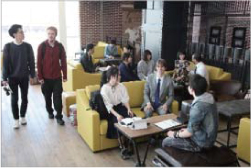Survival Skills in the Modern World

Burrhus Frederic Skinner, the American psychologist who pioneered the field of behavioral analysis, once said, “Education is what survives when what has been learned has been forgotten.” The meaning becomes clearer if we add the words “at school” after “has been learned.” But what remains after we forget what we have learned? And, if it’s okay to forget what we learn at school, why do we have to go to school in the first place?
Well, there are two things that remain: a knowledge of how to learn, and our motivation. Knowing how to learn means that when faced with a new challenge, we have the skills to gather relevant information, consider the problem from the right perspective, and create a solution. The fact is that after students graduate and begin working, these skills are more important than any other. We live in a time of rapid and continuous technological advancement, and people cannot survive in the workplace using only the information they learned in school. We must continue the process of learning in the workplace. That’s why knowing how to learn is one of our most important survival skills.
Motivation is the origin of our actions. When we connect our motivation to our work, we benefit not only by earning money, but also by getting a sense of satisfaction, connecting with other people, and contributing to society. It is important for people to have confidence in their ability to do this.
At Kanda University of International Studies, students acquire the ability and motivation to learn in two ways: autonomous learning support, and project-based learning (PBL). In autonomous learning support, students decide their own language-learning goals and create a study plan. Then, during the initial period of learning when students often feel frustrated or discouraged, our Learning Advisors provide support to help them persevere. After that, learning becomes a habit which students can continue. This experience is also useful when learning other things. In PBL, students select a topic they would like to study, and then recruit others to study with them. With the goal of learning about their chosen topic, students also develop their language abilities through autonomous learning. Thus, students can develop both their motivation and their ability to learn, which will serve them in their careers after graduation.
Kanda University of International Studies is near Kaihin-Makuhari in Chiba Prefecture. Located close to Tokyo Disneyland, the area is also home to the headquarters for many famous companies, including AEON, a supermarket chain that has expanded into China and Southeast Asia. We can be sure that employees at these companies in the area are engaged in project-based learning every day.

神田外語大学の英語学習施設
左の写真の建物の1 階SALC(Self-Access Learning Center) は英語の自立学習スペースで、ラーニングアドバイザーが語学教育専門の教員として学生の自立学習を支援している。2階はEnglish Only の空間となり、語学教育を専門とする外国人教員ELI(English Language Institute) が、個人のニーズにあった英語学習を支援している。
このRESEARCHに関連するリンク